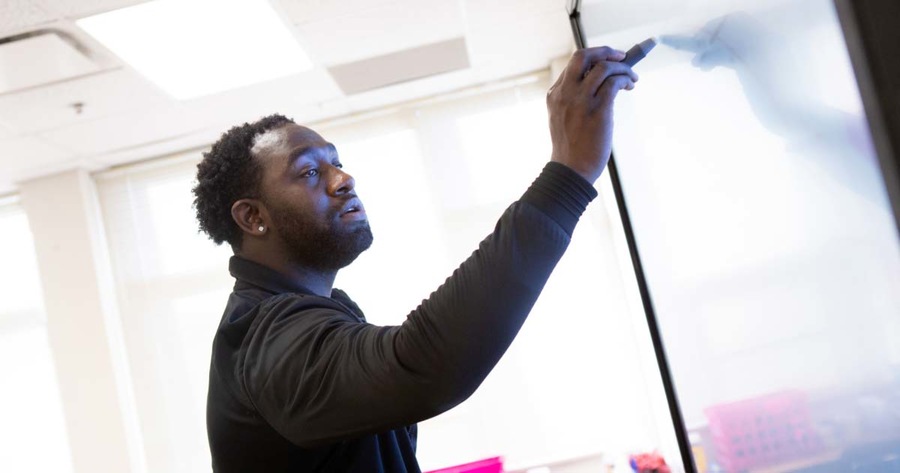Early Lessons from Schools and Out-of-School Time Programs Implementing Social and Emotional Learning presents findings from the first two years of the Partnerships for Social and Emotional Learning Initiative (PSELI), a multiyear effort exploring whether and how children can benefit from partnerships between schools and OST programs focused on building social and emotional skills. The report, authored by the RAND Corporation, focused on the six communities in PSELI, which is funded by The Wallace Foundation. It is designed to be useful to those carrying out SEL instruction in schools, out-of-school-time programs, or both.
When it comes to adults and SEL, research indicates it's crucial for adults to foster supportive relationships with students to aid in their social and emotional development, as well as adults developing their own SEL skills through professional development opportunities. During the PSELI study, there were several key takeaways as it relates to developing adults' capacity to promote SEL:
• PSELI communities viewed adult SEL skills as a foundation for building student SEL skills. Many interviewees viewed the development of adults' abilities to establish and maintain their own healthy relationships as the fundamental precursor to those adults effectively teaching their students how to do the same. The communities approached adult skill-building differently; some sites offered system-designed training and others developed their own approach.
• Staff wanted SEL PD to include hands-on practice and, as their SEL work progressed, to focus on differentiation of SEL instruction. Staff survey results indicated that differentiation was the topic for which the largest percentage of school and OST staff needed additional PD. Specifically, staff reported a need for PD to help them adapt SEL to meet the needs of students with disabilities or with cultural or linguistic differences.
• Staff turnover posed a persistent challenge for PD delivery. One way that PSELI communities tackled the staff turnover challenge was by offering some, but not all, PD in smaller chunks on a frequent basis. The communities also created calendars of scheduled PD for the entire second year of PSELI, indicating which PD activities were mandatory and what the purpose of each was, and distributed the calendars in advance so that sites could plan their schedules.
• Although support for SEL was high among school and OST staff, they also expressed concerns. One-third of school teachers in PSELI and one-half of OST instructors agreed or strongly agreed that adults other than themselves (such as counselors, psychologists, or parents) should take primary responsibility for their students' SEL needs. PSELI system and site leaders also described what they termed misperceptions about SEL. For example, SEL is necessary only for students with behavioral challenges; SEL is appropriate for young children but not adults; and integrating SEL would mean that students would not incur any consequences for misbehavior.
• Several PSELI communities have learned to centralize the delivery of at least some SEL PD for frontline staff, especially the PD about the SEL curriculum. Although most communities have taken a train-the-trainer approach—whereby someone from the central office at the system level trains one or two people (such as a SEL champion) from each site who, in turn, relays training to site-based staff—many communities have recentralized the role of SEL curriculum training in particular after finding substantial inconsistencies among sites and undue burdens on site-level trainers.
• SEL coaches have served a critical function in helping schools and OST programs deliver SEL instruction. Coaching provides a way to customize PD to teachers' or instructors' needs and helps ensure that it is relevant to their day-to-day work. Coaches also played a key role in fostering communication between school and OST staff and explaining how to deliver SEL instruction. However, in some PSELI communities, staff expressed confusion about the coaches' roles and responsibilities.
Overall, there were several early lessons and resulting recommendations from the study.
In recognition of staff turnover, the report suggests including in a recurring SEL PD schedule both longer sessions about SEL instruction and more-frequent but shorter sessions on more-discrete SEL topics. The report also stresses to not rely exclusively on a train-the-trainer model in which the responsibility for all SEL training falls solely onsite leaders—especially for training about SEL curricula (or content sequences) and pedagogy; content expertise is critical for those topics. Lastly, when using a SEL coach, develop a written document for coaches and site-level leaders that codifies the coaches' responsibilities, including minimum coaching requirements and number of visits, and discuss this document with each involved party.
To read more on the topic of developing adults' capacity to promote SEL, view the report in its entirety by clicking here.
Courtesy of NAA.
Photo courtesy of Allison Shelley for American Education: Images of Teachers and Students in Action.




